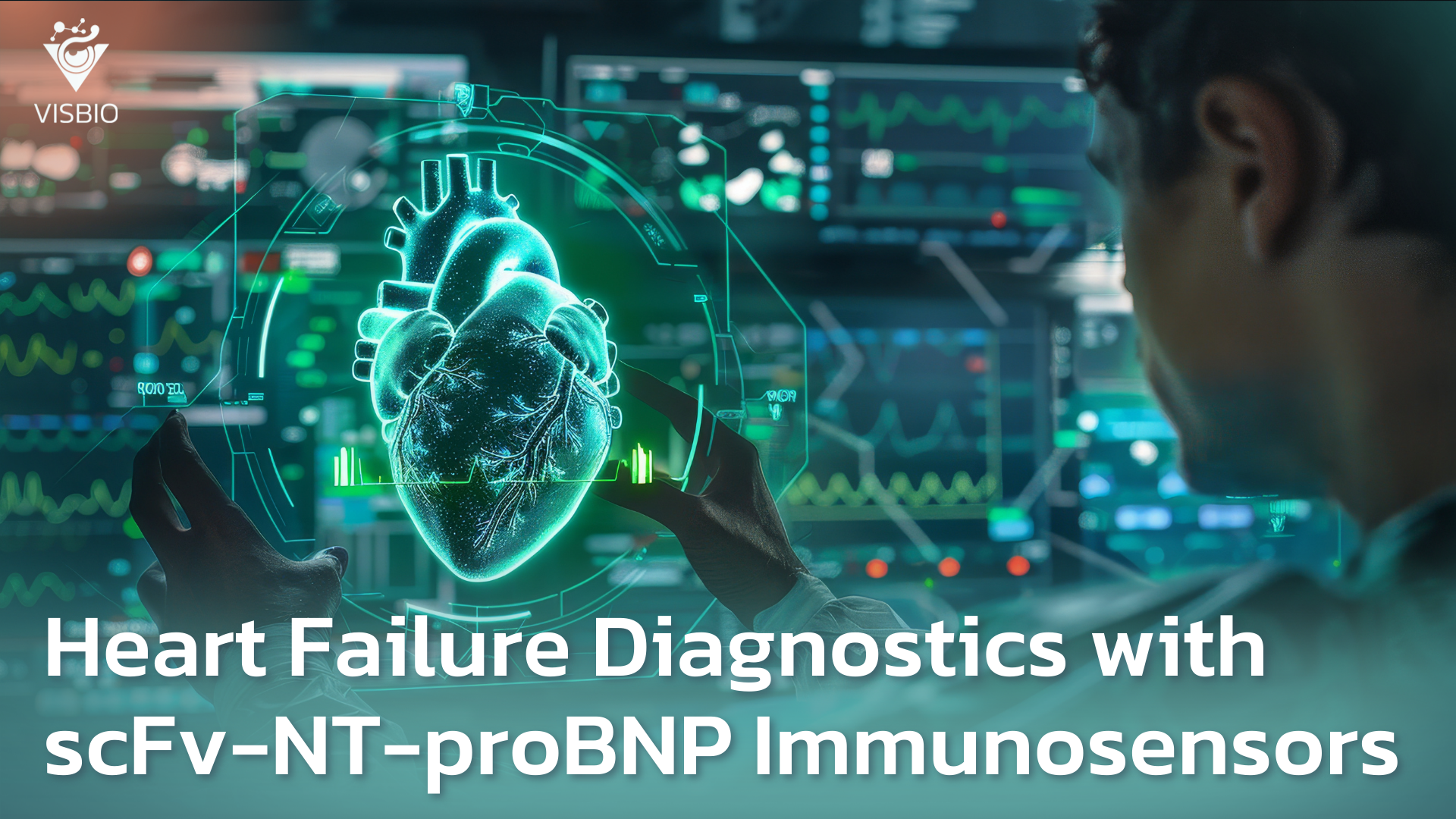Original Paper: Selection, alkaline phosphatase fusion, and application of single-chain variable fragment (scFv) specific to NT-proBNP as electrochemical immunosensor for heart failure
DOI: 10.1016/j.heliyon.2023.e19710
The Growing Need for Precise Heart Failure Diagnostics
Heart failure remains a critical global health issue, impacting over 56 million individuals worldwide. Early detection is vital for effective management, yet traditional diagnostic methods like echocardiography are not universally accessible, often requiring specialized equipment and trained personnel. This highlights the urgent need for more accessible, sensitive, and user-friendly diagnostic tools. The development of single-chain variable fragments (scFv) targeting the N-terminal pro B-type natriuretic peptide (NT-proBNP) offers a promising solution. These fragments, when incorporated into electrochemical immunosensors, provide a robust approach to early heart failure detection.
Innovative Use of scFv Technology in Electrochemical Immunosensors
scFv Technology: A Game Changer in Biomarker Detection
Single-chain variable fragments (scFv) are engineered proteins that combine the variable regions of antibody light and heavy chains, maintaining the binding specificity of full-sized antibodies in a more compact and stable form. Dr. Kiattawee Choowongkomon and his research team have developed scFv specific to NT-proBNP, a key biomarker for heart failure. NT-proBNP is preferred over BNP due to its longer half-life, making it a more reliable indicator for diagnostic purposes.
The Development Process: From Biopanning to Electrochemical Sensors

The research team employed biopanning techniques to identify scFv molecules that selectively bind to the non-glycosylated C-terminal of NT-proBNP. Among the 45 clones identified, scFv-16 and scFv-36 were the most promising. These fragments were subsequently fused with alkaline phosphatase (AP) to enhance their use in diagnostic assays. The fusion not only improved the expression yield but also increased the sensitivity of the scFv-36-AP variant, making it ideal for integration into electrochemical sensors.
Electrochemical Immunosensors: Enhancing Sensitivity and Specificity

The integration of scFv-36-AP into electrochemical immunosensors represents a significant advancement in diagnostic technology. These sensors detect changes in electrical currents when NT-proBNP binds to scFv on a graphene oxide-modified electrode. The study demonstrated an impressive detection limit of 69.09 pg/mL, significantly below the 150 pg/mL threshold used to rule out heart failure. This high sensitivity, combined with the specificity of scFv-36-AP, positions these sensors as powerful tools for early diagnosis, potentially reducing the need for more invasive diagnostic procedures.
What Does This Mean for Your Business?
Leading the Charge in Diagnostic Innovation
For businesses in the healthcare and medical device industries, adopting cutting-edge diagnostic tools like scFv-based electrochemical immunosensors can significantly enhance your product offerings. With the ability to detect NT-proBNP at extremely low concentrations, these sensors provide a competitive advantage by offering a more accurate and reliable method for early heart failure detection. This could lead to earlier interventions, improved patient outcomes, and a stronger market position for your products.
Reducing Costs and Improving Efficiency
Traditional diagnostic methods for heart failure often require expensive equipment and highly trained personnel. The scFv-based electrochemical immunosensors offer a cost-effective alternative that is easier to deploy and can be used in a wider range of settings, including point-of-care environments. By integrating this technology into your product line, you can reduce operational costs and streamline the diagnostic process, making it more accessible to a broader patient base.
Enhancing Patient Care and Trust
Incorporating advanced diagnostics like these into your offerings not only improves the accuracy of heart failure detection but also enhances patient trust in your brand. By providing healthcare providers with the tools they need to deliver better care, your business can build a reputation for innovation and quality in the medical field, leading to increased customer loyalty and long-term success.
Paving the Way for Accessible Heart Failure Diagnostics
The development of scFv-based electrochemical immunosensors marks a substantial leap forward in heart failure diagnostics. These sensors offer a unique combination of high sensitivity, specificity, and ease of use, making them suitable for widespread clinical application. As the prevalence of heart failure continues to rise, particularly in aging populations, these innovations could play a crucial role in alleviating the burden on healthcare systems and improving patient outcomes.
Partner with Us to Bring Cutting-Edge Diagnostics to Market
Dr. Kiattawee Choowongkomon and his team are leading the charge in developing next-generation diagnostic tools. If your organization is interested in investing in groundbreaking research with the potential to transform healthcare, we invite you to collaborate with us. Contact us today for a free consultation and explore how we can work together to bring these innovations to market.
About the Author

Associate Professor Dr. Kiattawee Choowongkomon is a renowned expert in biochemistry, specializing in protein engineering, biosensors, and diagnostic tool development. Through research collaborations with leading institutions both in Thailand and internationally, Associate Professor Dr. Kiattawee is committed to advancing scientific research with real-world applications.
About the Research
The research paper, Selection, alkaline phosphatase fusion, and application of single-chain variable fragment (scFv) specific to NT-proBNP as electrochemical immunosensor for heart failure, presents the groundbreaking work on scFv technology for heart failure diagnostics.


